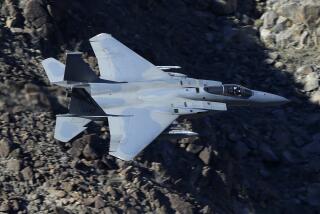New ‘Star Wars’ Chief: The Right Man for the Job--at the Right Time
- Share via
WASHINGTON — The “Star Wars” antimissile program has come down to earth and nowhere is that more evident than in the low-key character of the man who now runs it, Air Force Lt. Gen. George L. Monahan.
Earlier this year, Monahan replaced Lt. Gen. James A. Abrahamson, a “Star Wars” zealot and missionary who sold--some say oversold--the program as a talisman against nuclear holocaust.
Monahan, by contrast, modestly describes himself as merely a “program manager” who says that his job is not to be a promoter for “Star Wars” but to run a “sanity check” on the costly and controversial program.
“I ought to be skeptical,” the three-star general said Friday in his first interview with reporters. “I’ve got to be sure we’re right.”
Radical Changes
Monahan assumes control of the “Star Wars” program--formally known as the Strategic Defense Initiative--at a time when it is undergoing radical changes.
Former President Ronald Reagan envisioned “Star Wars” as an impenetrable shield consisting of futuristic weapons that would vaporize Soviet ballistic missiles as they rose from silos and submarines. Over the years, as questions about the cost and technology of such a system overwhelmed it, new ideas emerged for a far more limited program that would place partial defenses on the ground and in space in stages.
The latest twist is a concept called “Brilliant Pebbles,” swarms of little rockets permanently stationed in space, ready to respond to orders to track and destroy enemy missiles in flight.
On Friday, Monahan admitted that he had reservations about the Brilliant Pebbles program, saying that it is still “in the very early stages.” Added the general: “I wonder about its feasibility.”
Displays Sense of Humor
He also demonstrated a sense of humor rarely found in the Pentagon’s basement SDI complex when he said that if the Brilliant Pebbles idea fails, “Star Wars” will probably move on to “Genius Gravel.”
Monahan expressed doubts about the constellation of satellites to provide launch warning and communications between interceptor rockets. The 18 Space Surveillance and Tracking Satellites would provide “fat juicy targets” for Soviet anti-satellite weapons, Monahan said.
“We have a dependency here that I’m not real wild about,” Monahan said of the surveillance satellites. “That plus the cost.”
Abrahamson, ever the promoter, seldom let such doubts creep into his speech. In an “end-of-tour” memo written as he left SDI in March, Abrahamson heartily endorsed Brilliant Pebbles and offered a variety of suggestions for broadening the “Star Wars” program and increasing its visibility.
Abrahamson’s ideas fell on deaf ears in the Pentagon, which is facing a tightly constrained budget and where the generals and admirals have never been enthusiastic about what most of them believe is a pie-in-the-sky vision draining needed billions from real-world programs.
Defense Secretary Dick Cheney, in one of his first public appearances after taking over the Pentagon, said he believes that “Star Wars” was “oversold” in the Reagan Administration. He has proposed a $1-billion cut in its budget for the fiscal year beginning Oct. 1 and is planning to slash its five-year spending by 20%, to $33 billion from $41 billion.
Monahan, 58, said Friday that the direction of the program over the next several years will be guided by several cost and technical feasibility studies to be conducted this summer. He declined to predict where the program would go if Brilliant Pebbles and other promising new technologies prove unworkable or unaffordable.
Monahan is a highly decorated former fighter pilot with more than 4,000 hours of flying time and 122 combat missions in Vietnam. After service in Southeast Asia, he served in a variety of posts with emphasis on weapons procurement and program management.
He was promoted to lieutenant general in July, 1986, and is due to retire next year after 35 years on active duty.
His impending retirement clearly colors his approach to the job. He said that while “Star Wars” is “more in the spotlight, more in the fishbowl” than other military programs, his job as manager is not very different from what it was when he worked on other systems.
He does not have a lifetime invested in space weapons, Monahan said, and he is not pinning hopes of winning a fourth star on his performance at SDI. “To me, it doesn’t make that much difference.”
More to Read
Sign up for Essential California
The most important California stories and recommendations in your inbox every morning.
You may occasionally receive promotional content from the Los Angeles Times.










